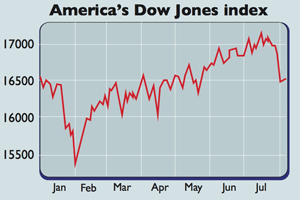Stocks stagger as end of party nears
Fears that the easy-money era is coming to an end has started to weigh on stock markets.

Get the latest financial news, insights and expert analysis from our award-winning MoneyWeek team, to help you understand what really matters when it comes to your finances.
You are now subscribed
Your newsletter sign-up was successful
Want to add more newsletters?

Twice daily
MoneyWeek
Get the latest financial news, insights and expert analysis from our award-winning MoneyWeek team, to help you understand what really matters when it comes to your finances.

Four times a week
Look After My Bills
Sign up to our free money-saving newsletter, filled with the latest news and expert advice to help you find the best tips and deals for managing your bills. Start saving today!
Stocks have stumbled badly in recent days. A sharp sell-off late last week left the Dow Jones index in the red for the year. The S&P 500 posted its worst weekly fall in two years, a slide of 2.6%. The pan-European FTSE Eurofirst 300 index slid by almost 3% last week to a four-month low.
Markets have been able to shrug off a wide array of problems so far this year, says Randall Forsyth in Barron's. These include China's banking system; the Isis insurgency in Iraq; the Ukraine crisis and sanctions on Russia; and Gaza. "Excluded from this list is the latest default by Argentina since, like the Chicago Cubs, anybody can have a bad century."
But all these issues now appear to have begun weighing on markets, while in Europe investors were also rattled by the deepening hole at Portugal's Banco Espirito Santo, which the state bailed out early this week.
MoneyWeek
Subscribe to MoneyWeek today and get your first six magazine issues absolutely FREE

Sign up to Money Morning
Don't miss the latest investment and personal finances news, market analysis, plus money-saving tips with our free twice-daily newsletter
Don't miss the latest investment and personal finances news, market analysis, plus money-saving tips with our free twice-daily newsletter
However, the main concern is that the end of the easy-money era is coming. Strong data this week suggested that interest rates could rise sooner than most people had imagined.
Markets have been "gorging" on cheap or free liquidity from printed cash or low interest rates for years now, says Allister Heath in The Daily Telegraph. But the party could be over soon. The US Federal Reserve is due to finish its money printing, or quantitative easing, programme, in October.
The markets had been pencilling a possible first rate hike in late 2015. But it's looking as though "we are closer tolift-off than the market assumed we were", says Fed member Richard Fisher. So uncertainty has crept into US monetary policy, which tends to dictate the tone for world markets.
American growth has rebounded

"When wage growth heats up," says The Wall Street Journal, "the economy will have absorbed enough jobs to push inflation higher." This could be starting to happen. Average hourly earnings are only rising at 2% a year, according to last week's job figures.
But other gauges tell a different story. For instance, the Employment Cost index (ECI), which monitors wage and benefit costs for employers, jumped by 0.75% in the second quarter, the fastest rise since early 2008.
A recent analysis by JP Morgan suggests that the ECI has been the best indicator among wage and labour-cost measures when it comes to predicting where inflation is headed.
Coping with higher rates
But this time round the amount of monetary loosening and money printing has been unprecedented, while debt loads have never been higher: in the developed world, total debt is worth 275% of GDP. So higher interest rates will be more of a burden than previously.
Given all this, the Fed and other central banks will be loath to tighten too soon in case the economy can't cope. But the danger of waiting is that inflation could take off, necessitating potentially larger and faster hikes later and squeezing the economy harder than they needed to in the first place.
Of course, they could time it beautifully, tempering inflation and allowing growth to continue. But since central banks "failed to anticipate the debt crisis of 2006-2008", says Buttonwood in The Economist, "this is an attitude of the purest optimism".
Get the latest financial news, insights and expert analysis from our award-winning MoneyWeek team, to help you understand what really matters when it comes to your finances.

-
 Should you buy an active ETF?
Should you buy an active ETF?ETFs are often mischaracterised as passive products, but they can be a convenient way to add active management to your portfolio
-
 Power up your pension before 5 April – easy ways to save before the tax year end
Power up your pension before 5 April – easy ways to save before the tax year endWith the end of the tax year looming, pension savers currently have a window to review and maximise what’s going into their retirement funds – we look at how